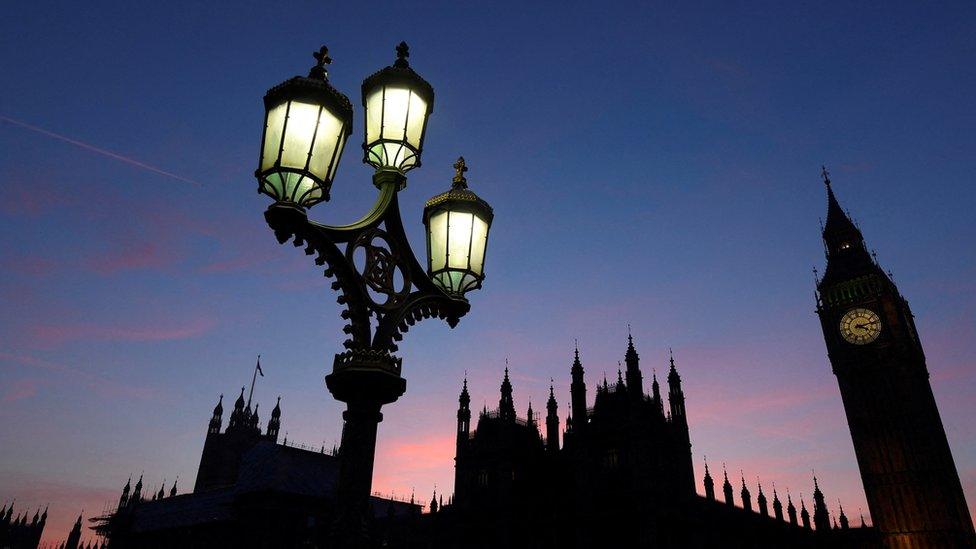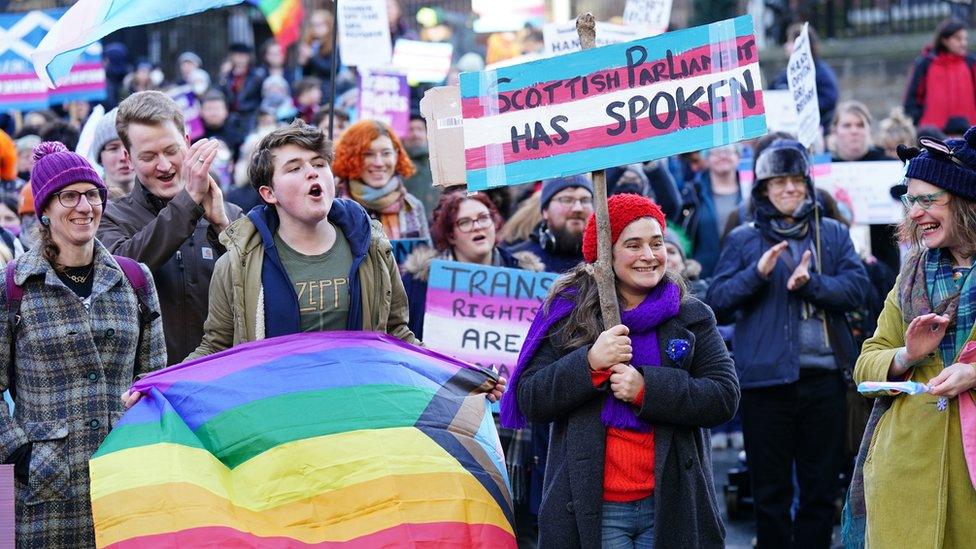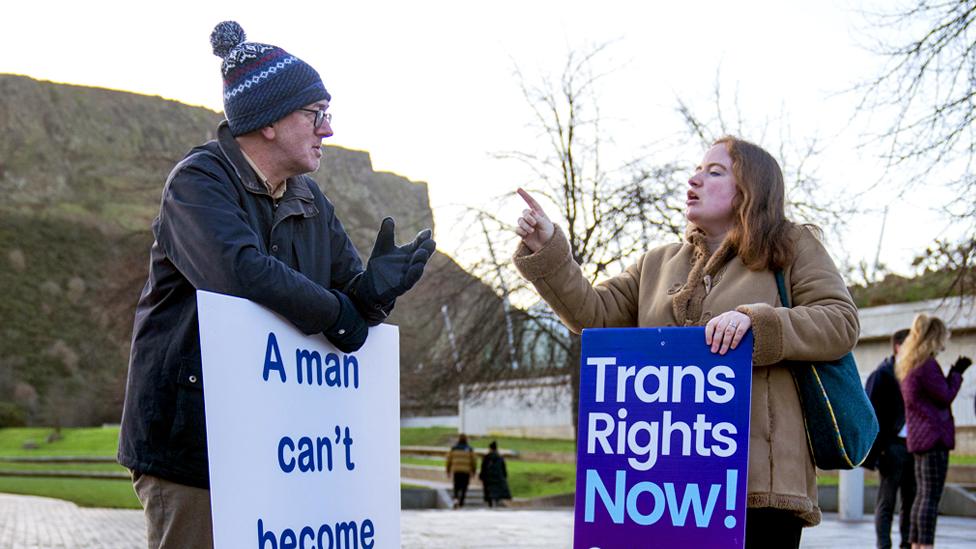What's happening in Parliament this week?
- Published

The parliamentary pot may not be boiling, but it's certainly starting to simmer with some significant action due in the coming week.
Having pushed the government into agreeing to criminal penalties for tech bosses who fail to protect children from harmful online content, with the promise of changes to the Online Safety Bill when it reaches the Lords, emboldened backbenchers now plan to do something similar with the Economic Crime Bill.
The Commons is due to spend two days on the detail of the bill this week, and a formidable array of senior MPs want tougher action, including imprisonment, for people who enable and facilitate money laundering.
It could be the culmination of a long-running campaign led by Labour's Dame Margaret Hodge, which has been given extra momentum by the war in Ukraine and a realisation of how much Russian money is funnelled through London.
The following week will see detailed debate on the Strikes (Minimum Service Levels) Bill - it will be time-limited on the floor of the Commons, so watch out for amendments and preliminary manoeuvres in advance.
The Human Rights Committee has just launched an inquiry into how the bill engages with Article 11 of the European Convention on Human Rights and the right to strike in other international agreements.

Another parliamentary sub-plot to watch out for is around the government's move to block the Scottish Parliament's Gender Recognition Reform Bill. The SNP is expected to "pray against" the order to stop the bill. That would result in a vote, but it is up to the government to decide if time should be provided for an actual debate.
One event that didn't take place this week was a personal statement from now independent MP Andrew Bridgen. He has completed a five-day suspension from the Commons after the Standards Committee ruled he had broken lobbying rules.
He was supposed to have apologised to the House, but I understand he was not able to agree the text of his statement. The sticking point seems to be his reluctance to offer an outright apology.
If it's not forthcoming, further action may follow. Mr Bridgen is currently suspended from the Conservative whip over comments he has made about Covid vaccines.
Monday 23 January
Commons: From 14:30, it's Work and Pensions Questions - probably followed by the usual post-weekend series of government statements and urgent questions.
The main debate will be on stages of the Northern Ireland Budget Bill.
Committees: Northern Ireland (15:00) hears from former Taoiseach Bertie Ahern in its inquiry into the Good Friday Agreement and how the institutions it created have performed in the 25 years since the peace deal was signed.
Levelling Up (16:00) quizzes minister Dehenna Davison on the distribution of Levelling Up funding - a very live question after the latest announcements.
Lords: From 14:30, the main debate will be on the details of the Trade (Australia and New Zealand) Bill, which implements a post-Brexit trade deal.
Tuesday 24 January
Commons: Health and Social Care Questions (11:30).
Conservative Bob Seely has a ten minute rule bill aimed at reducing SLAPPs - strategic lawsuits against public participation.
The main debate will see detailed consideration of the Economic Crime and Corporate Transparency Bill, the government's big new anti-corruption and money laundering measure. Russia's invasion of Ukraine has prompted increased scrutiny of Russian money in the UK, as well as of the activities of oligarchs from other countries.
Since the two ministers in charge, Tom Tugendhat (Home Office) and Kevin Hollinrake (BEIS), were strong backers of the transparency/anti-corruption agenda as backbenchers, their performances at the Despatch Box will be watched with added interest.
There are some significant amendments from a series of backbench heavyweights. Labour's Dame Margaret Hodge will press her familiar agenda to beef up Companies House, so more suspicious activities are investigated, with extra funding by increasing the fee to register a company to £100.
Other amendments call for regular reports to be made to Parliament on money laundering, and Labour is calling for a new select committee to be set up to monitor the issue.
Committees: Health and Social Care (10:00) considers possible links between pressures on A&E departments and excess patient deaths. One estimate has put the number of weekly excess deaths at 300-500.
Lords: Peers (14:30) have their first day on the details of the Northern Ireland Troubles (Legacy and Reconciliation) Bill. It sets up a new process to get to the truth of events during that period, but is opposed by Northern Ireland's parties.
Peers also consider new regulations on NHS dental services, along with a regret motion from Labour's Lord Hunt of Kings Heath who argues that the regulations won't improve access to dentistry.
Wednesday 25 January
Commons: Women and Equalities Questions (11:30), followed by Prime Minister's Question Time.
Conservative Dean Russell will present a ten minute rule bill to make mental health first aid a part of first aid training requirements.
The main debate will be further discussion of the Economic Crime and Corporate Transparency Bill, focusing on the areas the Home Office is responsible for. A cross-party duo of David Davis and Liam Byrne will push for a public interest defence for disclosures which reveal wrongdoing, and powers for the courts to reject cases which amount to legal timewasting or an attempt to prevent information being disclosed.

Backbenchers will try to strengthen a bill targeting money laundering
Meanwhile former Lord Chancellor Sir Robert Buckland and Justice Committee Chair Sir Bob Neill are pressing for new criminal offences around a failure to prevent fraud and money laundering, carrying a penalty of up to seven years in prison.
The Lib Dems' Layla Moran wants to force publication of the Home Office review of the Tier 1 (Investor) visa scheme.
Westminster Hall: Labour's Jessica Morden (14;30) has a timely debate on the steel industry, and Conservative Sir Gary Streeter (16:30) leads a debate on violence against women and girls in Plymouth.
Committees: Work and Pensions (09:15) continues its inquiry into the government's Plan for Jobs, and other initiatives aimed at helping people find and stay in work. There will be a panel of witnesses on the support available for older people, and then the committee will turn to the role of local councils in employment support.
Lords: Peers (15:00) debate the details of the Genetic Technology (Precision Breeding) Bill.
Thursday 26 January
Commons: Digital, Culture, Media and Sport Questions (09:30), followed by mini-question times for the MPs who speak on behalf of the Church Commissioners, the House of Commons Commission, the Public Accounts Commission, the Restoration and Renewal Client Board, and the Electoral Commission.
Backbench debates begin with a short statement from former health minister Dr Dan Poulter, who served on the Joint Committee considering the draft Mental Health Bill, external.
The committee, chaired by Conservative Lady Buscombe, highlighted worrying racial disparities in the way people are treated under mental health laws, and has proposed a significant strengthening of the bill, including creating a mental health commissioner and scrapping the use of community treatment orders outside the criminal justice system. The expectation is that an updated version of the bill, including these suggested changes, will soon be introduced into Parliament.
The day's main debate is on Holocaust Memorial Day, led by former Chancellor Sajid Javid.
Westminster Hall: Backbench debates on International Day of Education (13:30), led by Conservative former minister Vicky Ford; and on planning policy (15:00), led by Conservative Bob Seely.
Lords: Peers (11:00) will take part in debates chosen by backbenchers - first on the resilience of the armed forces, led by former defence minister Lord Robathan; and then on the life chances and educational prospects of vulnerable teenagers.
Neither House will sit on Friday 27 January.
- Published22 September 2022

- Published17 January 2023

